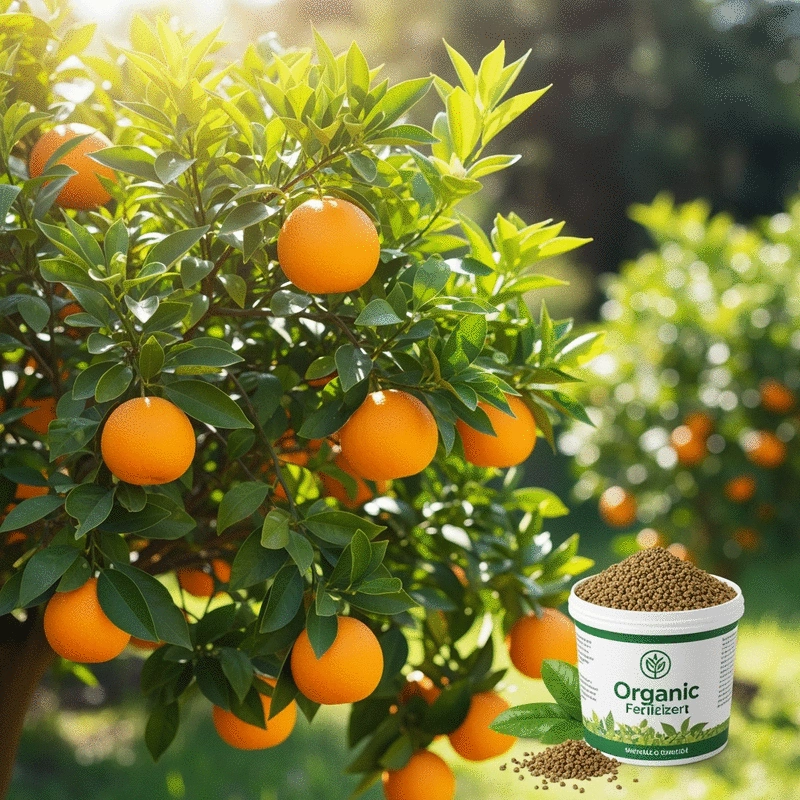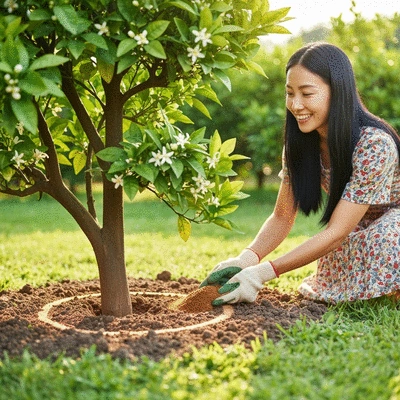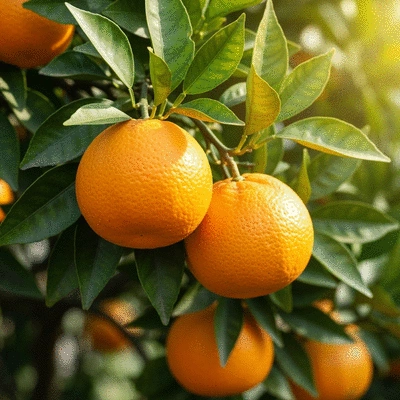Organic Fertilizers for Orange Trees

Have you ever wondered what makes your orange trees thrive? The key lies in understanding their unique nutrient needs, which ensures vibrant growth and delicious fruit. Let’s explore the essential insights you can gain from this valuable gardening knowledge!
What You Will Learn
- Essential nutrients for orange trees include nitrogen, phosphorus, potassium, magnesium, calcium, zinc, and iron.
- Symptoms of nutrient deficiencies such as yellowing leaves or small fruit can help diagnose issues early.
- Both commercial and homemade organic fertilizers provide effective nutrient sources tailored for orange trees.
- Sustainable practices like composting and reducing chemical usage promote healthier trees and a healthier environment.
Essential Nutrients & Deficiency Signs for Orange Trees
This visual compares the key nutrients vital for orange tree health with common signs of nutrient deficiencies, offering a quick guide.
Essential Nutrients for Orange Trees
-
•
Nitrogen: Lush foliage, stem growth.
-
•
Phosphorus: Root development, flowering.
-
•
Potassium: Fruit quality, disease resistance.
-
•
Magnesium: Photosynthesis.
-
•
Calcium: Strengthens cell structure.
-
•
Zinc/Iron: Metabolic functions.
Signs of Nutrient Deficiencies
-
•
Yellowing Leaves: Nitrogen deficiency.
-
•
Small/Deformed Fruit: Phosphorus/Potassium issues.
-
•
Browning Leaf Edges: Potassium deficiency.
-
•
Leaf Drop: Calcium deficiency.
-
•
Stunted Growth: General nutrient lack.
Understanding Nutrient Needs for Healthy Orange Trees
As a passionate horticulturist, I can’t emphasize enough how crucial nutrients are for the health and vitality of orange trees. These trees have specific nutrient requirements that support their growth and fruit production. The essential players in this process include nitrogen, phosphorus, potassium, along with important micronutrients like magnesium, calcium, zinc, and iron. These elements work together to keep your trees flourishing and productive! For more insights on optimal growth, explore our guide on growing oranges in your backyard.
The Essential Nutrients for Citrus Growth
Nitrogen is vital for promoting lush foliage, while phosphorus helps with root development and flowering. Potassium is essential for fruit quality and strengthens the tree's resistance to disease. On the micronutrient front, magnesium is important for photosynthesis, calcium strengthens cell walls, and zinc and iron play significant roles in metabolic processes. It’s a delicate balance, but ensuring your orange trees receive the right nutrients can lead to a bountiful harvest.
- Nitrogen: Supports leaf and stem growth.
- Phosphorus: Enhances root and flower strength.
- Potassium: Improves fruit quality and disease resistance.
- Magnesium: Vital for photosynthesis.
- Calcium: Strengthens cell structure.
- Zinc and Iron: Important for metabolic functions.
When you keep these nutrients in mind, you’re setting your orange trees up for success. Regularly monitoring and adjusting their nutrient intake will ensure vibrant growth and juicy fruits!
Signs of Nutrient Deficiencies in Orange Trees
It’s important to recognize when your orange trees are struggling with nutrient deficiencies. Some common symptoms can help you diagnose issues early, ensuring you can take action promptly. For instance, if you notice yellowing leaves, it could indicate a lack of nitrogen. Meanwhile, poor fruit set or small, malformed fruit can signal phosphorus or potassium deficiencies.
- Yellowing Leaves: Often a sign of nitrogen deficiency.
- Small or Deformed Fruit: May indicate phosphorus or potassium issues.
- Browning Leaf Edges: Could suggest potassium deficiency.
- Leaf Drop: Often associated with calcium deficiency.
- Stunted Growth: Can indicate a lack of essential nutrients.
By being vigilant and understanding these signs, you can take the necessary steps to amend your fertilization practices, ensuring your orange trees remain healthy and productive. This attention to detail can significantly impact fruit quality, much like understanding harvesting tips for Australian oranges.

Exploring Organic Fertilizer Options for Orange Trees
Commercial Organic Fertilizers: What to Look For
As I’ve explored various options, I’ve found that using commercial organic fertilizers can provide a reliable nutrient boost for my trees. One excellent choice is GrowScripts Citrus Fertilizer. It’s designed specifically for citrus trees and provides a balance of essential nutrients that support their growth. When selecting a commercial fertilizer, look for products that are certified organic, provide a balanced NPK ratio, and include micronutrients.
Homemade Organic Fertilizer Solutions: Easy Recipes
Creating homemade organic fertilizers can be both simple and rewarding! Here are a few recipes that I often use in my own gardening:
- Grass Trimmings: Chop up fresh grass clippings and mix them into the soil to boost nitrogen levels.
- Leaf Litter: Collect fallen leaves and turn them into compost for a nutrient-rich addition.
- Coffee Grounds: Sprinkle used coffee grounds around the base of your trees to enhance acidity and provide nitrogen.
- Fish Emulsion: Dilute fish emulsion in water and apply as a foliar spray for a nutrient-rich boost.
These homemade solutions not only save you money but also help in developing a sustainable gardening approach!
Effective Organic Amendments: Cow Manure, Bone Meal, and More
To enhance the health of your soil, organic amendments can make a big difference. I often incorporate cow manure, which adds valuable nutrients and improves soil structure. Bone meal is another great option, providing a slow-release source of phosphorus that supports root development and flowering. Other beneficial amendments include organic compost, which adds a wealth of nutrients back into the soil, ensuring your orange trees thrive.
Comparative Analysis of Fertilizer Types
When deciding between commercial and homemade fertilizers, it's essential to weigh the pros and cons. Here's a comparison chart that summarizes the key aspects to consider:
| Fertilizer Type | Pros | Cons |
|---|---|---|
| Commercial | Reliable nutrition, tailored for citrus | Can be expensive, may contain synthetic additives |
| Homemade | Cost-effective, eco-friendly | Requires more effort and knowledge |
By understanding these differences, you can make an informed decision that aligns with your gardening philosophy and the needs of your orange trees!
Engaging Poll: Your Favorite Fertilizer!
We'd love to know your thoughts! Which type of fertilizer do you prefer for your orange trees?
Summarizing Key Insights on Organic Fertilizers for Orange Trees
In our journey through organic fertilization, we’ve learned that choosing the right fertilizer is vital for the health and productivity of our beloved orange trees. By understanding the nutritional needs of these trees and their specific circumstances, we can make informed choices that promote growth and sustainability.

When selecting an organic fertilizer, consider factors like the NPK ratio, soil conditions, and the specific needs of your trees. It's not just about throwing down some fertilizer and hoping for the best—it's about creating a nurturing environment for your oranges to thrive! For more on sustainable practices, consider learning about sustainable orange farming in Australia.
Choosing the Right Organic Fertilizer
- Nitrogen Sources: Look for high-nitrogen options like blood meal to promote leafy growth.
- Phosphorus Sources: Choose fertilizers rich in bone meal to encourage root development and flowering.
- Potassium Sources: Consider kelp meal or greensand for overall tree health and fruit quality.
- Micronutrients: Ensure your fertilizer includes essential micronutrients like magnesium and zinc for optimal growth.
Remember, each orange tree is unique, and their needs may vary based on soil quality and local climate. So, assess your trees regularly to choose the most suitable organic fertilizer.
FAQs About Organic Fertilization for Orange Trees
- What are the most essential nutrients for orange trees?
- The most essential nutrients are nitrogen, phosphorus, potassium, magnesium, calcium, zinc, and iron. Each plays a crucial role in the tree's health and fruit production.
- How can I tell if my orange tree has a nutrient deficiency?
- Common signs include yellowing leaves (nitrogen deficiency), small or deformed fruit (phosphorus/potassium issues), browning leaf edges (potassium deficiency), leaf drop (calcium deficiency), and stunted growth (general nutrient lack).
- Are commercial organic fertilizers better than homemade options?
- Both have pros and cons. Commercial fertilizers offer reliable, tailored nutrition but can be expensive. Homemade options are cost-effective and eco-friendly but require more effort and knowledge to balance nutrients effectively.
- What are some easy homemade organic fertilizer recipes?
- You can use grass trimmings for nitrogen, leaf litter for compost, coffee grounds to enhance acidity and provide nitrogen, and fish emulsion as a nutrient-rich foliar spray.
- How do organic amendments like cow manure and bone meal help orange trees?
- Cow manure adds valuable nutrients and improves soil structure. Bone meal provides a slow-release source of phosphorus for root development and flowering. Organic compost also enriches the soil with a wealth of nutrients.
Exploring Sustainable Fertilizer Options: What Works Best?
Sustainable agriculture practices are becoming increasingly important in our quest for healthier oranges and a healthier planet! Organic fertilizers such as blood meal, soybean meal, and microbial inoculants offer fantastic options for nourishing our citrus trees while supporting the ecosystem.
Using organic fertilizers not only meets the nutritional needs of our trees but also improves soil structure and promotes biodiversity. It’s a win-win! Incorporating these sustainable practices in our gardening routines can lead to vibrant, thriving orchards.
Encouraging Sustainable Practices in Fertilization
- Reduce Chemical Use: Opt for organic fertilizers over chemical ones to minimize environmental impact.
- Compost: Create your compost to recycle kitchen scraps and yard waste, enriching your soil naturally.
- Mulching: Use organic mulch to retain moisture and suppress weeds while adding nutrients as it breaks down.
- Soil Testing: Regularly test your soil to understand its nutrient content and adjust your fertilization practices accordingly.
By integrating these sustainable practices, we can foster a healthier environment for both our orange trees and the planet! It’s all about making small changes that add up to a significant impact.
Call to Action: Nurturing Your Orange Trees for Optimal Growth
Start Your Organic Fertilizing Journey Today
Now that we've explored the essentials of organic fertilization for orange trees, it's time to take action! I encourage you to apply these insights to your own gardening practices. Start by assessing your trees' needs and trying out some of the organic fertilizers or amendments we discussed. Share your experiences or any questions in the comments below—I’d love to hear how your orange trees thrive!
Recap of Key Points
Here is a quick recap of the important points discussed in the article:
- Nutrient Needs: Ensure your orange trees receive essential nutrients like nitrogen, phosphorus, potassium, magnesium, calcium, zinc, and iron for robust growth and fruit production.
- Signs of Deficiencies: Look out for symptoms like yellowing leaves (nitrogen deficiency) and small or deformed fruit (phosphorus or potassium issues) to address nutrient deficiencies promptly.
- Organic Fertilizer Options: Both commercial and homemade organic fertilizers can effectively nourish orange trees. Consider options like blood meal for nitrogen, bone meal for phosphorus, and kelp meal for potassium.
- Sustainable Practices: Incorporate practices such as composting, mulching, and reducing chemical use to enhance soil health and promote ecological balance.
- Regular Monitoring: Assess your trees' nutritional needs regularly to ensure they thrive and produce high-quality fruit.
Popular Posts
 What if a little seasonal care could transform your orange trees from ordinary to extraordinary? Und
What if a little seasonal care could transform your orange trees from ordinary to extraordinary? Und
 Reducing waste in orange production is more than just a trend; it's a commitment towards sustainabil
Reducing waste in orange production is more than just a trend; it's a commitment towards sustainabil
 Have you ever considered how a simple fruit like an orange can elevate your summer desserts? With th
Have you ever considered how a simple fruit like an orange can elevate your summer desserts? With th
 Are you ready to make a difference with every bite you take? Embracing organic oranges not only tant
Are you ready to make a difference with every bite you take? Embracing organic oranges not only tant
